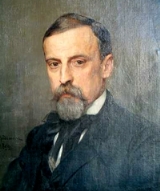
-winning novelist. A Polish szlachcic (noble) of the Oszyk coat of arms
, he was one of the most popular Polish writers at the turn of the 19th and 20th centuries, and received the Nobel Prize in Literature
in 1905 for his "outstanding merits as an epic writer."
Born into an impoverished noble family in the Podlasie village of Wola Okrzejska
, in Russian-ruled Poland
, Sienkiewicz wrote historical novel
s set during the Rzeczpospolita
(Polish Republic, or Commonwealth).
Life deserves laughter, hence people laugh at it.![]()
Riches, glory, power are mere smoke, vanity! The rich man will find a richer than himself; the greater glory of another will eclipse a man who is famous; a strong man will be conquered by a stronger. But can Cæsar himself, can any god even, experience greater delight or be happier than a simple mortal at the moment when at his breast there is breathing another dear breast, or when he kisses beloved lips? Hence love makes us equal to the gods, O Lygia.![]()
Not Nero, but God, rules the world.![]()
I consider that in dialectics I am the equal of Socrates. As to women, I agree that each has three or four souls, but none of them a reasoning one.![]()
Whoso loves beauty is unable for that very reason to love deformity. One may not believe in our gods, but it is possible to love them...![]()
No God has promised me immortality; hence no surprise meets me. At the same time thou art mistaken, Vinicius, in asserting that only thy God teaches man to die calmly. No. Our world knew, before thou wert born, that when the last cup was drained, it was time to go, — time to rest, — and it knows yet how to do that with calmness. Plato declares that virtue is music, that the life of a sage is harmony. If that be true, I shall die as I have lived, — virtuously.![]()
A man who leaves memoirs, whether well or badly written, provided they be sincere, renders a service to future psychologists and writers, giving them not only a faithful picture, but likewise human documents that may be relied upon.![]()

